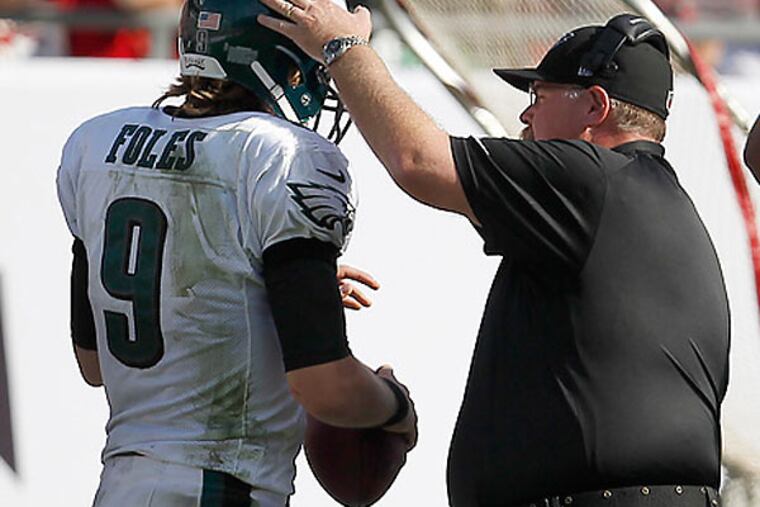How Foles could factor in Eagles' coach search
SOMETIME after the first of the year, Eagles owner Jeffrey Lurie - along with, presumably, general manager Howie Roseman - will sit down and interview several people to be the team's next coach. There will be talk about philosophies and about potential assistant coaches and like that. Then the question will be asked:

SOMETIME after the first of the year, Eagles owner Jeffrey Lurie - along with, presumably, general manager Howie Roseman - will sit down and interview several people to be the team's next coach. There will be talk about philosophies and about potential assistant coaches and like that. Then the question will be asked:
What do you think of Nick Foles?
It is the most fundamental of questions for this franchise. It is what the last few weeks have been about for the Eagles and it is what the next few weeks will be about. Deciding the current abilities and the realistic future for the rookie quarterback out of Arizona is the only thing that matters at this point. Everything else is just drama and noise.
Sunday's last-second comeback at Tampa was justifiably praised. The last four games for Foles have demonstrated steady improvement. There will be 7 1/2 games of video for the coaching candidates to study before their interviews - and then they will be asked the question:
What do you think of Foles?
And does the wrong answer end the interview right there?
It is one of the fascinating by-products of Foles' continuing development. With each game he plays, with each step in his progression, there are more and more people who believe he has a future as an NFL starting quarterback. If feelings are as high after the season-ending game against the Giants as they are today, it will be fair to say that most people in the fan base would be happy to see the Eagles move forward with Foles as the quarterback.
But that is popular opinion, not that of professionals watching the video in a dim room, over and over. Because Foles has a big arm, except for sometimes. And because Foles still needs to improve a bit on the deep throws. And because there is a nimble aspect to his game within the pocket but there is no way to make him faster, as was demonstrated on that scrambling touchdown against the Bucs.
So if you are a read-option kind of coach - if that is Oregon coach Chip Kelly's vision for an NFL offense, for example - is there any way you can make it work with Foles? If not, does that suddenly disqualify you from the conversation?
Does the coach pick the quarterback?
Or, does the quarterback pick the coach?
We are getting a little bit ahead of ourselves, of course. Foles' progress so far has been linear - straight up, week after week - but if there is one thing that NFL people know it is that nothing is linear, that there are always stumbles, interruptions, tactical retreats, whatever you want to call them. If Foles does not have a setback in the final three games of the season, he will be the exception.
To inject a stat into the conversation, note this: In his four starts so far, Foles has played Washington (23rd in NFL points allowed), Carolina (21st), Dallas (22nd) and Tampa Bay (20th). There has not been a killer defense in the bunch, not yet. But his last three games, starting Thursday night, will be against Cincinnati (13th), Washington again, and the New York Giants (eighth).
The point is that it gets harder from here - which is good for Foles, good for the team, good for everyone. The Bengals game is especially interesting because it adds a layer of complication to Foles' task with the short week, and it brings in the best defense he has seen, and it brings in a Cincinnati team in a desperate fight for a playoff spot.
The best way to find out about Foles is to throw as many things at him as possible. The Tampa game was a perfect example. The ending, we know about - he showed poise, and gumption, and had enough of the necessary confidence and mental wherewithal to go over to the sidelines and tell the coaches the play he wanted to run. You cannot duplicate that situation in practice.
But it was even more than that. They dropped him back 57 times in that game and he did not wilt. He had thrived with a balanced attack, but there was no running game Sunday and there was no pass protection and there was a fourth-quarter deficit that had to be overcome through the air. And he did it. Again, it is something you cannot practice - and he did it.
It is all good right now. If it is still like this on New Year's Day, there will be only one correct answer for the coaches whom Lurie interviews.